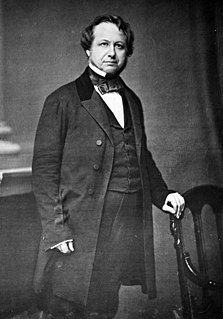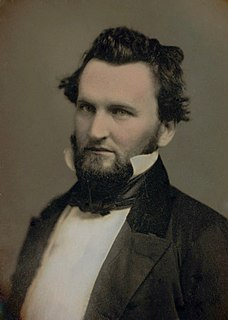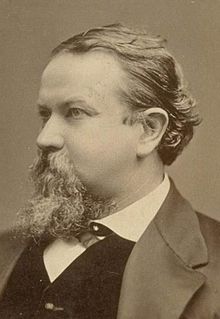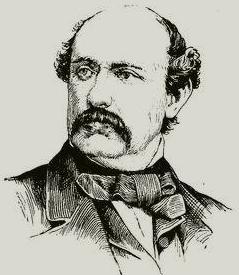
The Governor of Michigan is the chief executive of the U.S. state of Michigan. The current governor is Gretchen Whitmer, a member of the Democratic Party, who was inaugurated on January 1, 2019, as the state's 49th governor. She is eligible for a second term under Michigan's term limits, which limit a governor to only two, four-year terms.

John Isaac Guion was an American politician from Mississippi who served as Governor in 1851.

William Bigler was an American politician. A Democrat, he served as the 12th Governor of Pennsylvania from 1852 to 1855, and later a U.S. Senator for Pennsylvania from 1856 until 1861.

John Neely Johnson was an American lawyer and politician. He was elected as the fourth governor of California from 1856 to 1858, and later appointed justice to the Nevada Supreme Court from 1867 to 1871. As a member of the American Party, Johnson remains one of only three members of a third party to be elected to the California governorship.

Milton Slocum Latham was an American politician, who served as the sixth governor of California and as a U.S. Representative and U.S. Senator. Latham holds the distinction of having the shortest governorship in California history, lasting for five days between January 9 and January 14, 1860. A Lecompton Democrat, Latham resigned from office after being elected by the legislature to fill the U.S. Senate seat left vacant by the death of David C. Broderick in a duel.

John McDougal was an American politician who served as the second Governor of California from January 9, 1851 until January 8, 1852. He previously served as the first Lieutenant Governor of California, from 1849 to 1851.

James Herbert Budd was an American lawyer and Democratic politician. Involved in federal and state politics, Budd was a member of the U.S. House of Representatives for the 2nd California district from 1883 to 1885, and served as the 19th Governor of California from 1895 until 1899.

Jewett William Adams was an American politician. He was the fourth Governor of Nevada. He was a member of the Democratic Party.
The Dean of the United States Senate is an informal term for the Senator with the longest continuous service, regardless of party affiliation. This is not an official position within the Senate, although customarily the longest-serving member of the majority party serves as President pro tempore.

The California gubernatorial election, 1861 took place on September 4, 1861. Incumbent Governor John G. Downey was not a candidate for renomination, as his Democratic Party had violently ruptured over the issue of slavery and secession. Downey was a Lecompton Democrat, those who favored slavery in the Kansas Territory and who were running as now as the Breckenridge or "Chivalry" Democrats. These Chivalry Democrats supported Attorney General John McConnell. Anti-slavery or anti-secession Democrats were the "Unionist" Democrats who favored John Conness.

Rodman McCamley Price was an American Democratic Party politician, who represented New Jersey's 5th congressional district in the United States House of Representatives from 1851–1853, and served as the 17th Governor of New Jersey, from 1854 to 1857.

Peter Hardeman Burnett was an American politician and the first Governor of California as a state in the U.S., serving from December 20, 1849, to January 9, 1851, and the first to resign from office. Burnett was governor for almost one year before California's admission to the United States in 1850.
Henry Smith was the first American-born Governor of the Mexican territory of Texas and briefly presided over the revolution there, serving during the Battle of the Alamo, Battle of Goliad, and Battle of San Jacinto. He is one of 4 governors from Garrard County, Kentucky, a historically Whig and Republican county located in Kentucky's Bluegrass region.
All except those in italics won the general election and were elected Governor of California.
The 1851 United States Senate election in New York was held on February 4 and March 18/19, 1851, by the New York State Legislature to elect a U.S. Senator to represent the State of New York in the United States Senate.
The United States Senate elections of 1850 and 1851 were elections which had the Democratic Party lose seats, but retain a majority in the United States Senate.
Rancho Arroyo de la Laguna was a 4,418-acre (17.88 km2) Mexican land grant in present-day Santa Cruz County, California given in 1840 by Governor Juan B. Alvarado to Gil Sanchez. The grant extended along the Pacific coast south-east from Rancho San Vicente and San Vicente Creek to Laguna Creek and Rancho Refugio.

The 2018 California gubernatorial election was held on November 6, 2018, to elect the 40th Governor of California. Incumbent Democratic Governor Jerry Brown was ineligible to run for reelection for a third consecutive term due to term limits from the Constitution of California.














